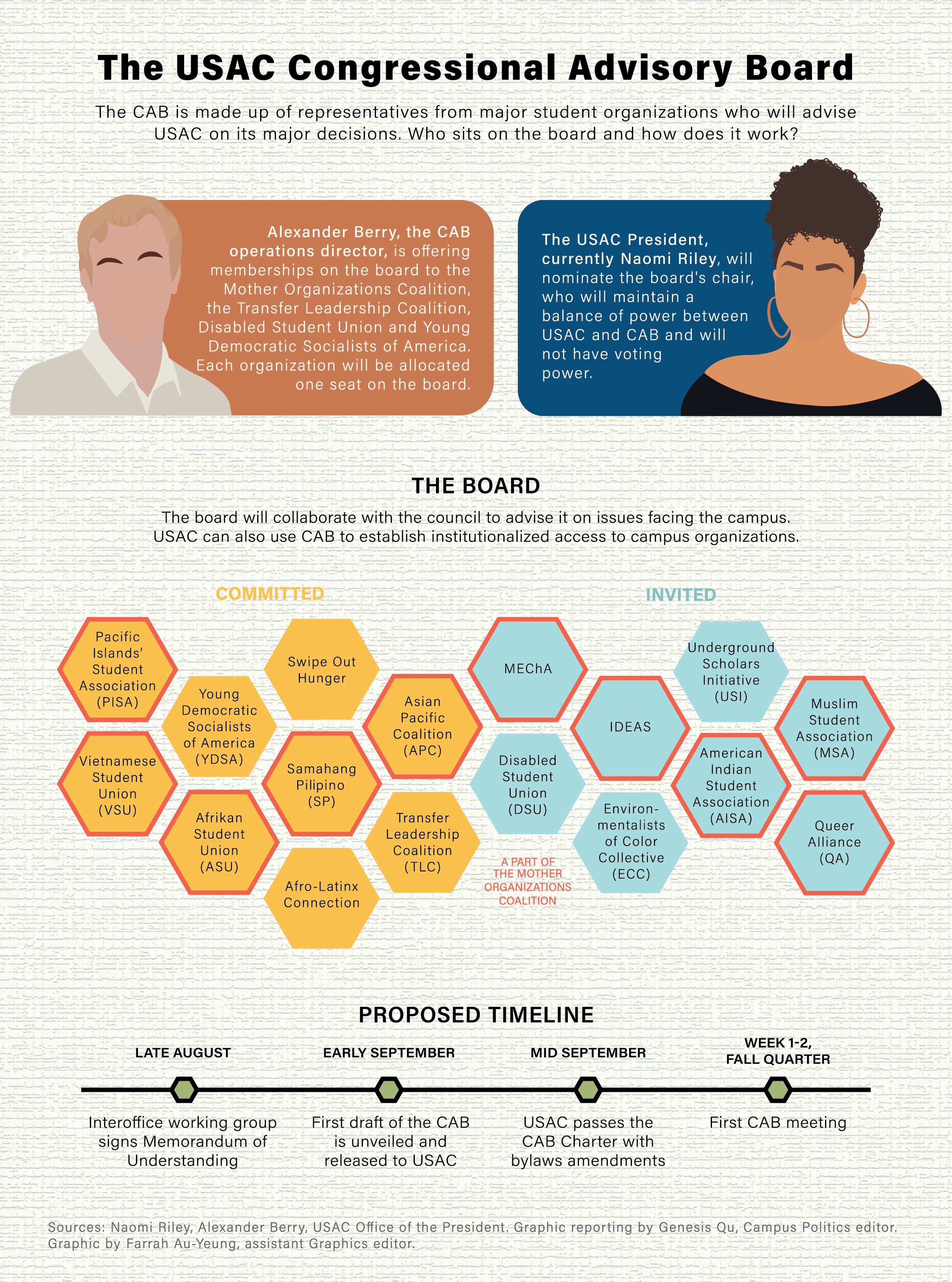USAC Congressional Advisory Board to amplify voices of student organizations

The Congressional Advisory Board is a body of student organizations that will advise the Undergraduate Students Association Council on its policies.
By Aaron Untiveros
Aug. 29, 2020 5:28 p.m.
The undergraduate student government is recruiting campus organizations to join a board to advise the student government’s policies.
The Congressional Advisory Board, which was formed over the summer, is made up of student groups from around campus, such as the Afrikan Student Union, Samahang Pilipino and the Transfer Leadership Coalition. The board will inform the Undergraduate Students Association Council of community concerns and coordinate with the council to advance policy goals, according to a draft of the CAB’s charter provided by the USAC Office of the President.
Under the CAB’s charter, the board would be able to review the council’s surplus allocations, create joint resolutions with USAC and submit its own legislation. CAB can address USAC on agenda items that the board has expressed a particular view on, the charter added.
The board can also appoint and hire its own staff with stipends, the charter states.
CAB formalizes USAC’s relationship with student organizations, said Alexander Berry, the director of CAB and a staff member at the USAC Office of the President.
“Instead of having to know someone (in the organization), you have someone who’s sitting on CAB who you can reach out to,” said Berry, a rising third-year history student. “It cuts the middle man.”
USAC President Naomi Riley, who campaigned on increased student access to the council, said that although CAB is independent of USAC, it would oversee the council’s decisions and vote on its own recommendations.
“It’s really important to make sure that it’s not just 15 people at the table who are privy to a lot of important information that are making these critical decisions,” she said.
The USAC president will appoint a non-voting chair to represent CAB’s interests at USAC meetings, Berry said. Each student organization on CAB will appoint one representative with voting power to CAB, he added.
As of Aug. 29, nine of the 17 contacted student groups have agreed to join the board, Berry said.
The first wave of recruitment focused on organizations that are larger and more established, Berry said. His team plans to target smaller and more issue-specific organizations in Nov., he added.
After CAB finishes the two waves of recruitment, it will invite other organizations based on recommendations from existing members, Berry said. Berry said he expects CAB to hold its first meeting in early Oct. The board will then meet on a weekly or bi-weekly basis for the rest of the year, he added.
CAB could give historically marginalized groups access to USAC and its policymaking, said Eduardo Velazquez, the interim president of MEChA de UCLA, an organization for the Chicanx community at UCLA.
“I think that (CAB) really is addressing the concerns that communities have had about not having direct access to USAC and therefore to the (UCLA) administration,” Velazquez said.
Although CAB is open to all organizations recognized by the Office of Student Organizations, Leadership and Engagement, organizations representing some groups, such as women and south campus students, are not present in the board’s initial composition.
Monetha Raghani, the marketing director for V.O.I.C.E. Mission LA, a feminist organization at UCLA, said CAB should have voices on the board that actively discuss gender inequality on campus.
“I definitely think there needs to be more action … more education and awareness,” Raghani said. “That effort should include change in (USAC) policy because they need someone who has that perspective to be able to implement those policies to help better change the campus.”
Berry said he met with SOLE director Mike Cohn to discuss the challenges of recruiting CAB members equitably. Since there are more than 1,000 campus organizations, Berry said he and his team are looking to find ways to make sure membership qualifications do not undermine CAB’s mission to include diverse student voices.
Berry said his team is modifying their outreach plan to expand the types of student organizations represented on the board.
“This board really needs to be equitable and representative of all voices on campus,” Berry said. “We’re going to be talking inside the office about how to include these other voices that we might have initially missed.”


